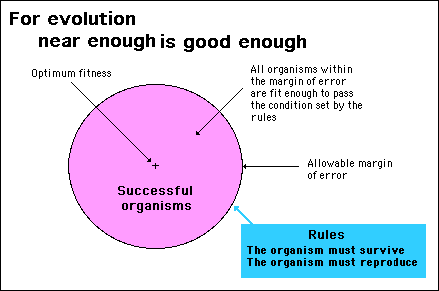

Near enough - Genetic algorithms
by Peter Small

Near enough is good enough
Genetic algorithms are believed by most scientists to be the mathematical proof that underwrites the theory of evolution. These are search algorithms that randomly try out different values of the variables involved in a solution and gradually arrive at the optimum values.
Not everyone agrees. There are several versions of what is called the "Free Lunch Theory" that proves conclusively that genetic algorithms are nothing special: as "the performance of any algorithm averaged over all possible cost functions will be the same as that of any other algorithm". This view is particularly championed by William A. Dembski in his book "No Free Lunch", where he states "evolutionary algorithms are incapable of providing a computational justification for the Darwinian mechanism of natural selection and random variation as the primary creative force in biology".
However, what the proponents of this view don't seem to take into consideration is that the evolutionary process doesn't have to search for an exact solution: near enough is good enough (see diagram above). In other words, evolution doesn't seek to find the optimum solution for fitness, it needs only to find a solution that is near enough in order to achieve a particular objective. In the case of evolution this is enough fitness to be able to survive and reproduce.
This is important because although genetic algorithms are not any more efficient than any other search algorithms at finding optimum solutions, they are far more efficient at getting a solution that is near enough. In this context, genetic algorithms do provide the mathematical proof that underwrites the theory of evolution.
For this reason we can use the technique of evolution - which is to try out different values of the variables of a system - until a 'near enough' solution is found.